Tirzah: moments of pure serenity
The avant-garde R&B artist's new album is her most personal work yet – but she couldn't have made it alone
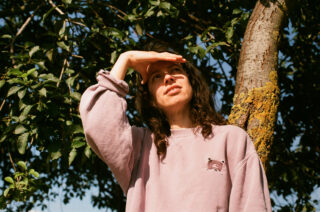
The avant-garde R&B artist's new album is her most personal work yet – but she couldn't have made it alone
It was sunny when I got on the tube. By the time I emerge in North Greenwich, the sky has darkened and the weather has closed in. Even though it’s been a tourist attraction since the year 2000, this part of South London is one of those areas that seem to be terminally under construction, and it takes a couple of minutes to adjust to the swirling dust and sounds of cranes whirring overhead before I can get my bearings and figure out where I need to be.
Tirzah Mastin is standing nearby, nursing the last few dregs of a coffee and waiting outside Now Gallery. Dressed in a sweater, patterned trousers and flip flops, she’s curious to find out what’s happening inside. On paper, at least, it sounds amazing. Called My Head is a Jungle, it’s an exhibition of new work from graphic artist Manjit Thapp and the available literature promises an artificial jungle that doubles as a metaphor for the fractured nature of human memory. Tirzah rummages around in her bag and produces a boiled sweet, and with that, we head in.
Unfortunately, the real experience doesn’t match up with what the brochure promised. Expecting to meander through a maze of greenery, uncovering tangled thoughts and suppressed fears, instead we’re treated to an experience that is more like a cross between a Brick Lane poster sale and the outdoor section of a B&Q. The art is certainly interesting, the various portraits and images acting as a window to a deeply personal experience, and the art, hidden down nooks and crannies, is clearly intended to take you on an emotional journey, but it’s all a bit too sparse to be the immersive experience promised. It’s only when we reach the end that we discover something that really holds our attention. The far wall has been turned into a guestbook of sorts, and previous visitors have been invited to leave their deepest thoughts and confessions. Hundreds of little Post-it notes speak of anxieties, hopes, dreams and comments that range from the banal to actually quite profound. Together, we spend a good thirty minutes scouring the wall, looking for the best. Squatting on her haunches, Tirzah suddenly lets out a laugh. “Come look at this one,” she says. Peering down, I find the simple green note, covered in a shaky, childlike scrawl. It simply reads: “I FEEL OVERWHELMED BY: Apple Crumble.” I look back at Tirzah, who nods. “I know what they mean.”
Back outside, I ask her what she thinks of the exhibition. “I have to say, it didn’t really grab me,” she shrugs. “Maybe I’m a bit too traditional, but I found all the extras a bit too distracting. I’d rather see something stripped back so that the message is really impactful, rather than being forced to be in a world or something. Don’t get me wrong, it was very skilful and I could see what they were going for, but there was just too much going on. There’s something about being forced to shut out everything that’s going on around you and just allowing the space to penetrate your thoughts.”
Tirzah is definitely one of the people you’d want to ask about visual art. Her early education was very much steeped in music, having left her Essex home aged 13 to concentrate on composition and the classical harp at the prestigious Purcell School for Young Musicians, just outside Watford. Burnt out by the time she graduated, she retrained at the London College of Fashion to become a graphic designer, and spent several years working in the capital’s fashion industry. You could say that she knows a thing or two when it comes to illustration.
“I stopped working about three and a half years ago, but that was more to do with having my baby,” she tells me. “I always intended to go back, and they were always really open and flexible about it, but it just never made sense timewise. I really love working there – everyone was really lovely and I think of them often. But miss it? Not really, I’ve just been way too busy.”
Faced with dealing with the pandemic with two young children in a flat in Peckham, she recently relocated to the South London suburb of Sidcup, mainly for the space and to be closer to friends and family. She’s modest when talking about her career in music and is always ready to spread the credit. Brushing her curls from her face in the whipping South London wind, she’s softly spoken, quick to laugh and disarmingly frank; a demeanour that is almost the total opposite of the raw, emotionally charged nature of her music. Blending R&B, grime and down tempo garage with experimental soundscapes and avant-garde song structures, her compositions are fractured and deeply enigmatic, leaving you feeling a warm sense of communion without fully understanding what it is that you just listened to.
Even though it left us both feeling a bit cold, there are parallels you can draw between Tirzah’s and Thapp’s work. Like the Birmingham-born illustrator, Tirzah’s output has a journal-like quality, using repeated motifs, phrases and textures to create a confessional map of human emotion. ‘Send Me’, the first track released from her new album, is a good example of what I mean. A typically minimal-sounding track with a blend of looping guitars and softly-spoken R&B vocals, its lyrics talk about conjuring the strength to be a mother. Written shortly after the birth of her second son, the lyrics speak of finding a new well of love within yourself. “Let me heal and now I’m sure,” she whispers on the song’s refrain. It’s both intimate and oddly distant, and like the best of Tirzah’s work, it reaches down deep and pulls up something that is truly transformational.
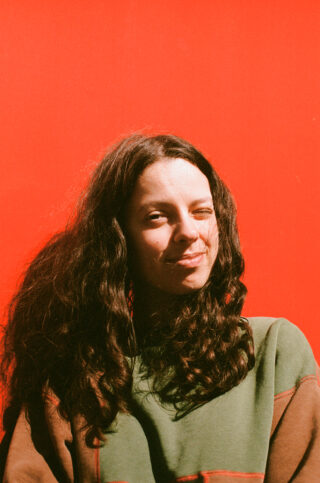
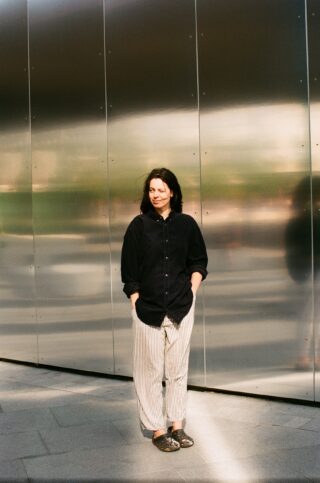
Deciding to escape the sound of heavy construction, we head towards the river and find a quiet spot to continue our conversation. As we walk, we pass by the entrance to the O2 Arena and stop to take in a line of people silhouetted against the skyline as they begin their climb to the top of the kilometre-long dome to its viewing platform. As we watch, Tirzah recalls the time her class at school visited when it was called the Millennium Dome. “The only other time I’ve been here was when I came to watch Beyoncé,” she remembers as we continue on. “It was amazing, but I don’t know how she does it. She has to basically go out there and give 100% every time.”
She makes an interesting point. Popular opinion may paint pop musicians as a bunch of over-pampered millionaire divas – and in some regards they are – but when you think about what they actually have to do on stage, the bigger you are, the more impossible it becomes to simply phone it in. On top of that, there’s spending almost every waking moment rehearsing, performing and promoting, and the constant feeling that you have to be somewhere and be doing something. I ask Tirzah if, on the more indie side of the fence, she’s ever felt the same kind of pressure. “Gosh, I mean, never say never, but nothing like that,” she answers after a short pause. “Obviously, there’s pressure all around you, but there’s no comparison. I don’t take it on board like that; I’ve never found music to be this all-encompassing, all-consuming thing that takes over your life, and I don’t think I’d ever want it to. That’s nuts – I couldn’t imagine a life like that.”
Looking around for a quiet spot, we eventually find a bench where we can watch the boats as they navigate the river. Almost immediately, a British Airways jet roars overhead to completely destroy the sense of tranquillity. Inevitably, the conversation quickly focuses on Colourgrade, Tirzah’s second album, her first in three years. Written while she was in the depths of promoting her debut, Devotion, it was recorded in the downtime between the birth of her first child and shortly before her second child was born. Almost subconsciously, it ended up being a snapshot of what turned out to be a pivotal year in the singer’s life, and almost unintentionally, the songs weave together the thoughts, themes and energy of a time of pregnancy, birth and of being a new parent.
“Mostly we wanted this record to be a fresh start and a clean slate,” she explains. “Devotion was the culmination of years and years worth of working together, but all that was kind of a memory by the time we got back to the studio. It was an exciting feeling to be able to write with the knowledge that these songs didn’t have to be for something or get sent anywhere. For the first time in ages, we could just let them be what they wanted to be.”
The result is an album that can be quite disorientating at times. Oscillating between discordant noise and moments of pure serenity, Colourgrade’s more abstract sounds are closer to the more freeform feel of Tirzah’s early YouTube mixtapes than her previous studio album. According to the singer, a lot of this is down to the improvisational nature of her writing process.
“More often than not, I’m reacting to the music Coby [Sey] and Mica [Levi] are making, so most of the time I’m trying to find a poem that goes along with it,” she says when we chat about how she created the record. “That means that the phrasing often ends up strongly dictating what the words are going to be; it’s really more important that you’re capturing the intent behind a phrase rather than trying to squash in loads of words and be overly descriptive. It’s the only way you can stay true to the essence of how you felt when you were in that moment, so it means that the album has ended up incorporating a whole mishmash of different feelings and inspirations, rather than being about just one thing.”
Predictably, motherhood has been the theme that most press coverage has focused on ahead of the album’s release this October. In the official press release for the record, it’s described as being “inspired by a type of love between a mother and a child, while simultaneously working as an artist.” Tirzah, however, sees the connection as circumstantial at best. While it’s definitely a source of energy for Colourgrade, she is also determined that the record paints a picture that balances the spiritual aspects of being a mum with the much more mundane side of things. “To me, as a musician, whether you’re playing the oboe or the double bass, you’re putting your feelings into whatever you’re playing. Similar to when you’re writing something, your thoughts and feelings go into the words, but it’s never been about me sitting down thinking, ‘I’m going to write about this or that.’
“I’m a musician and I’m a mum, so naturally those things are going to intertwine, but it really doesn’t go any further than that. It’s not like this is the album about motherhood. Obviously, the record still means a lot to me as I know it will carry these feelings, but it doesn’t feel right to say that this album is only about this one thing.”
Besides, Colourgrade is far too nebulous for that; it’s a record that is more about moods, moments and textures, much like the photographic technique from which it takes its name, involving tweaking exposures and manipulating tones to get closer to the essence of what the photographer is trying to convey. “I think the title comes from the song on the record more than anything,” says Tirzah. “I just felt that the song ‘Colourgrade’ represented the spectrum of feelings and textures we were going for. It just seemed to be emblematic of what we were doing right there and then. I didn’t know what it meant to be honest, it was just something that I wrote, but when I heard it was a real process I was kind of like, ‘Do I still want to call it that?’, and the answer was, ‘Yeah, why not?’. Anyone can take any word they want and change the meaning – it’s one of the best things about being an artist.”

Throughout our conversation, Tirzah is keen to make sure that Colourgrade is seen as a team effort, and she’s happy to concede that a big part of the thinking came from her longtime collaborator Mica Levi. It’s a partnership that stretches back to the pair’s school days at Purcell, through the early years in London when Levi was a rising star on the city’s underground music scene with Micachu and the Shapes, when Tirzah still worked a day job in graphic design. The relationship is still going strong today, even as Levi’s success seems unstoppable. Transforming herself from a regular at Peckham’s nightclubs to an Oscar-nominated composer and sound artist, recent years have seen her pick up a stream of accolades and critical applause, particularly for her work on the soundtracks for Jonathan Glazer’s Under the Skin and Pablo Lorrain’s Jackie.
“So far, we’re still friends, at least,” chuckles Tirzah when I ask about her work with Levi. “I honestly couldn’t imagine working any other way. Don’t get me wrong, I’ve never wanted to be a ‘stuckist’ and just stick religiously to one way of doing things. In the past, I’ve done stuff with Bauer, Mura Masa and Tricky – all really great experiences that felt like dipping my toes into other worlds – but I’ve always believed that music should be a sharing thing and I’ve always been more comfortable when I’m working with my closest friends. I’ve been super lucky that I’ve been able to keep that going for so long. It’s always really lovely whenever we get a chance to get together.”
Levi’s fingerprints are on almost every aspect of Colourgrade. In fact, the more we speak, the more it becomes clear that Tirzah’s role is closer to curator than instigator. Describing one of the duo’s typical jam sessions, she reveals that the songs are mostly portmanteaus taken from different parts of an improvisation. Working together, a lot of her time is spent sifting through the various jams, identifying the moments that resonate and weaving them back together into a more fleshed-out, captivating experience.
“Not a lot of people talk about this, but a lot of the creative process is in the mixing, mastering and the ordering,” she explains. “A lot of it is about what you take out rather than what you leave in. You have to think about what’s best for the record, and make those sacrifices.”
No doubt a key factor in Tirzah’s distinctive sound, this relationship with Levi is, however, just one of many partnerships that fuel the singer’s creativity. Even though she does all the interviews, shows up for the photo shoots and features in most of the videos, Tirzah is more inclined to view her output more as a tapestry and describes herself more as a member of a band than a straight-up solo artist.
“Looking back, it’s always kind of confusing to me why we ended up calling all this ‘Tirzah’,” she says. “It was just one of those quick-fire decisions that I ended up saying ‘Ok, cool’ to. I didn’t really think much more about it than that. I mean, I get that it’s quite abstract-sounding – most people wouldn’t know it was a name – but looking back I’m not sure it was a good choice. I’ve always felt like it’s a real team effort, and I don’t think the name gives that impression.”
If you do want to get an impression of what that extended crew looks like, then it’s really worth checking out the video for recent single ‘Hive Mind’. Directed by Leah Walker and Rebecca Salvadori, it’s a ten-minute mini-documentary that begins with around six minutes of footage of the whole gang just hanging out around their favourite south London spots. As Tirzah invites you in with a flower, the video follows the group as they move between what looks like a birthday party, a warehouse show and scenes of traversing suburban streets. Taken as a whole, it’s a collage of sorts, an electrifying roadmap to the connections between humans, nature and the environment that shape a group of friends.
“It was totally Leah and Rebecca’s idea,” she says. “They collected all of the material and just found that it started to fall together into this film-like narrative. We just kind of went with that. I think what is so cool is that it really captures what we’re about. I think the way people perceive the process and the way it actually works is something that often gets lost in the muddle, and it tends to end up with just one person representing the work of all these different people. In some small way, it was great to be able to put something out that addressed that.”
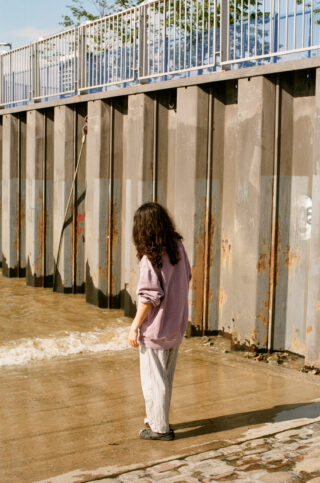
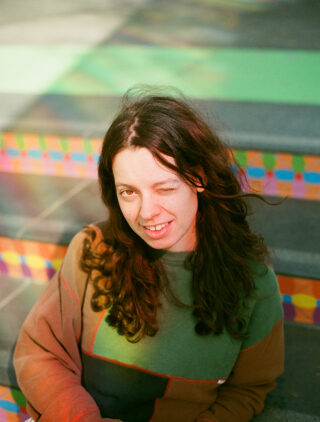
‘Hive Mind’ is a tribute to this sense of community, the call-and-response vocal a duet between Tirzah and another long-time collaborator, Coby Sey, who also contributes lyrics to new single ‘Tectonic’. It’s one of a number of tracks on Colourgrade that features the extended CURL collective, a tightly-knit group of interdisciplinary artists that also includes Levi and Brother May amongst their number. Sey’s elder brother, producer Kwes, also happened to mix most of the album.
Tirzah seems genuinely thrilled to have Sey more closely involved. “It just felt really natural to have him on this one,” she says. “We worked really closely together, writing words and poems on the board of the studio and reciting and singing them together. We’ve been working and playing live since we toured in support of Devotion and it felt really right to have him more involved on this record. It was really special.
“As an artist, I think the people you work with are important as it creates a network and kinship with people that are also making music in a way that is always open and carefree,” she says with a widening grin.
It’s common for many parents to find that their friendship groups shrink as soon as they have kids, but in Tirzah’s case it feels like the group dynamic is only getting stronger. “Don’t get me wrong, being a mum has been full-on and you’re busy,” she says, “but it’s important to take the time and make sure that you can still keep in touch with people. When I was younger, I was free to go to more shows and hang out more and it’s been great to keep at least a small aspect of that. I mean, I’m not solitary, but also I could never be called a social butterfly, so I couldn’t say I was really out there. But speaking for myself, it’s great to be among a bunch of people who still feel the love for one another.”
Yet another passenger jet howls over, drawing a line under our conversation. Tirzah pauses to fish a boiled sweet out of her bag before she readies herself to find a taxi. Before she leaves, she turns back to deliver one last thought. “It really does take a community to make music. You’re always feeding off one another, inspiring and encouraging them in the same way that they’re inspiring and encouraging you. I’ve always said that it takes more than one person to make a song, unless you’re Prince or something, and it’s nice when you’re able to pay tribute to that in some way or form.”